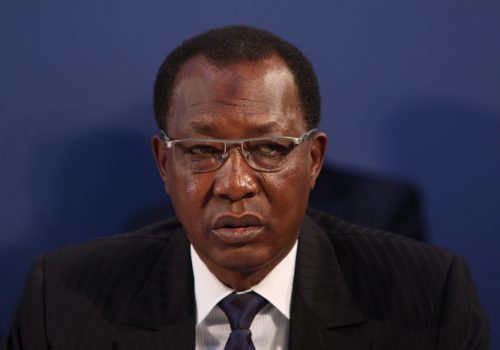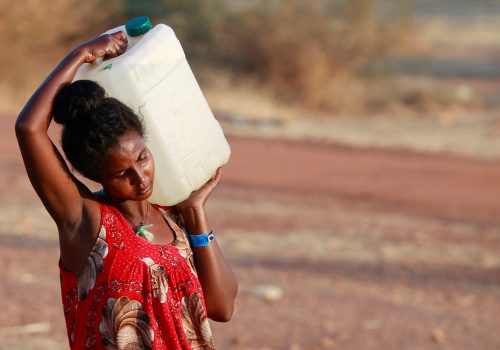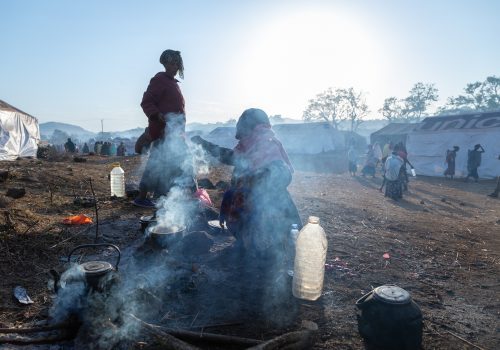FAST THINKING: After the death of its president, Chad is on the brink
JUST IN
More tumult is coming to the Sahel. After three decades in power, Chadian President Idriss Déby was killed following clashes with insurgents, state media announced Tuesday. What’s next for the country after the fall of its long-ruling autocrat? And what does Déby’s death mean for French and US military involvement in the region? Our Africa experts are here to sort through the fast-shifting news.
TODAY’S EXPERT REACTION COURTESY OF
- Cameron Hudson (@_hudsonc): Nonresident senior fellow at the Africa Center and former director for African affairs at the US National Security Council
What’s at stake
- The nation of sixteen million “has largely been viewed by Western powers as a critical state in staunching the spread of radical Islam and terrorism from the western Sahel region” Cameron says, “and as a buffer to the long-term instability coming from Sudan’s Darfur region on Chad’s eastern border” and from its northern border with Libya since the overthrow of dictator Muammar Gaddafi.
- But in recent days, thousands of anti-Déby rebels from the Front for Alternation and Concord in Chad (FACT), entering Chad from Libya, have been seizing territory and advancing toward the capital, N’Djamena. The country’s poor economic condition and low voter turnout in Déby’s recent re-election—“widely seen as fraudulent,” Cameron notes—suggest “FACT could well be successful in tapping into pent-up frustration from within the military and civilian ranks,” he adds.
Subscribe to Fast Thinking email alerts
Sign up to receive rapid insight in your inbox from Atlantic Council experts on global events as they unfold.

The French connection
- France, which once ruled Chad as a colonial power and has been active in fighting Islamist militants throughout the Sahel, openly backed Déby by unleashing airstrikes against an incursion by FACT rebels in 2019. Rama points out that the entire Chad-based French military mission in the Sahel, which has been going on for nearly a decade, will now come under greater scrutiny.
- “The military response is clearly not enough to overcome the terrorist threat,” she says, despite the financial and military backing of the United States. The United States, France, and other international actors need to “tackle one of the main weaknesses of foreign intervention: the lack of results on the economic and social-development fronts. It is urgent to address the roots of terrorist contagion.”
The scenarios ahead
- Déby’s thirty-seven-year-old son, Mahamat Idriss Déby, a four-star general, will rule for the next eighteen months ahead of elections, according to the government. But that’s no sure bet, according to Cameron: “There is a great deal of uncertainty around how events in Chad will unfold: whether the army will stay loyal to Déby’s son and continue the effort to repel the advancing rebels; whether Chad’s citizens, fed up after thirty years of Déby’s rule and on the heels of his sixth re-election, will join the rebels to undo the current political dispensation. Either scenario presents a high risk of civilian casualties and a likelihood that fleeing civilians or soldiers could export Chad’s instability to neighboring states.”
- France and the United States, which has its own military presence in the Sahel, must now also decide whether to stick with the younger Déby. “Advancing Western security interests and supporting a civilian-led transition in Chad are not mutually exclusive goals,” Cameron advises.
- “Chad is not just Déby,” Rama reminds us. “The country can write a new page of its history provided that the transition is not confiscated by his family or by a clan.”
Further reading
Mon, Apr 19, 2021
Will events in Chad force a reset of Sahel strategy?
AfricaSource By
In the last week, several columns of rebel fighters have entered Chad from neighboring Libya with the intention of unseating long-time strongman and friend of the West Idriss Déby Itno, Chad’s ruler for the past thirty years. How France and the United States respond may cause repercussions for years to come.
Fri, Nov 20, 2020
FAST THINKING: Get up to speed on the crisis in Ethiopia
Fast Thinking By
A fast-developing crisis in Ethiopia has the crucial US ally edging closer to all-out war, just two years after Prime Minister Abiy Ahmed took office promising democratic reforms and a year after he won the Nobel Peace Prize. So what happened? Today we’re turning to Cameron Hudson, an expert on the region and former US diplomat and intelligence officer, for a look behind the headlines.
Wed, Mar 3, 2021
The unintended consequence of Ethiopia’s civil war might be a border war with Sudan
AfricaSource By
Ethiopia is at war with itself—and the international community is struggling to respond. The stakes in Tigray are high and the civilian toll could be considerable. But there’s another scenario, with the potential to exact an even higher toll, that many observers are overlooking: conventional war that could break out at any moment between Sudan and Ethiopia and their many allied proxies.
Image: Chad's President Idriss Déby shown after a meeting with French President Francois Hollande at the Élysée Presidential Palace, in Paris, on February 14, 2014. Photo by Stephane Lemouton/ABACAPRESS.COM via Reuters.


